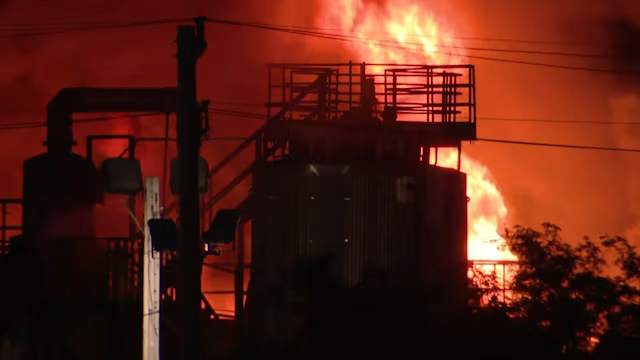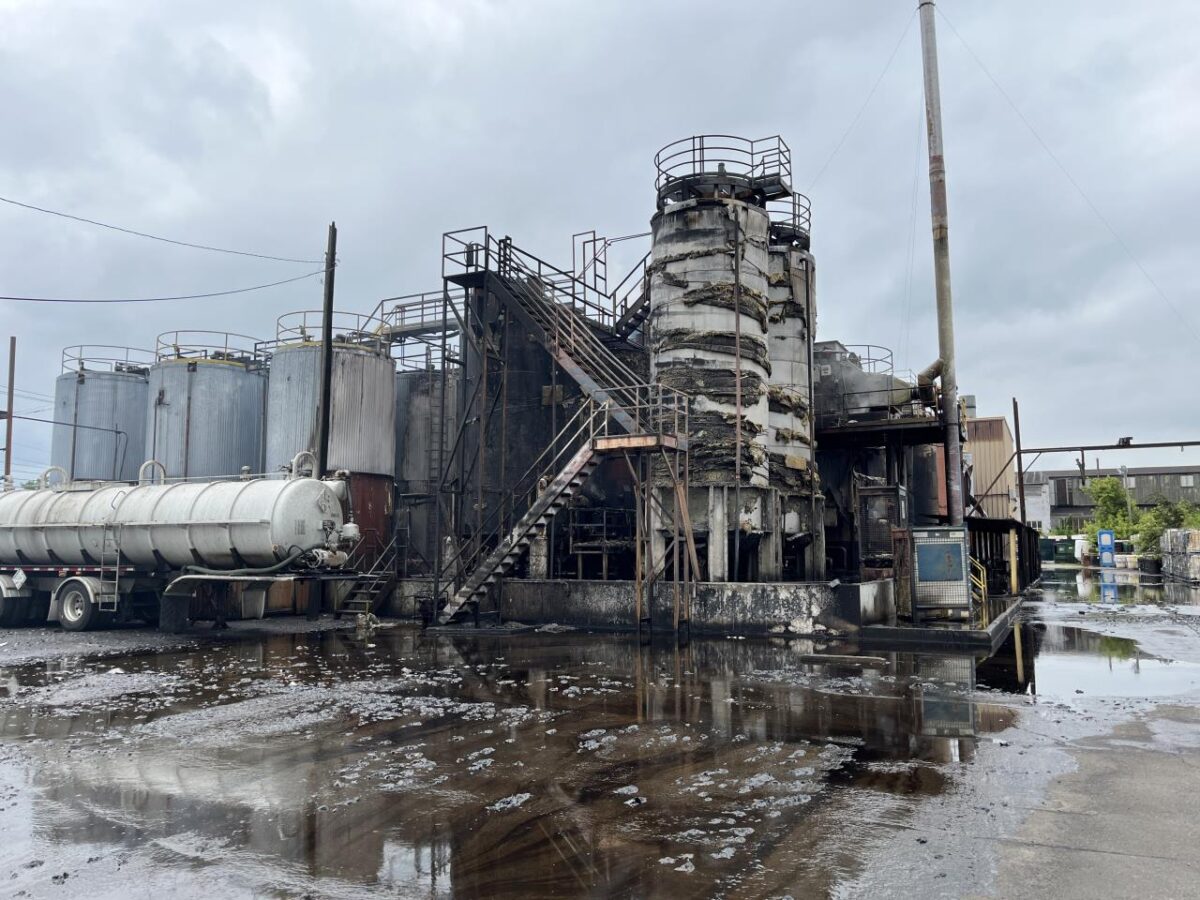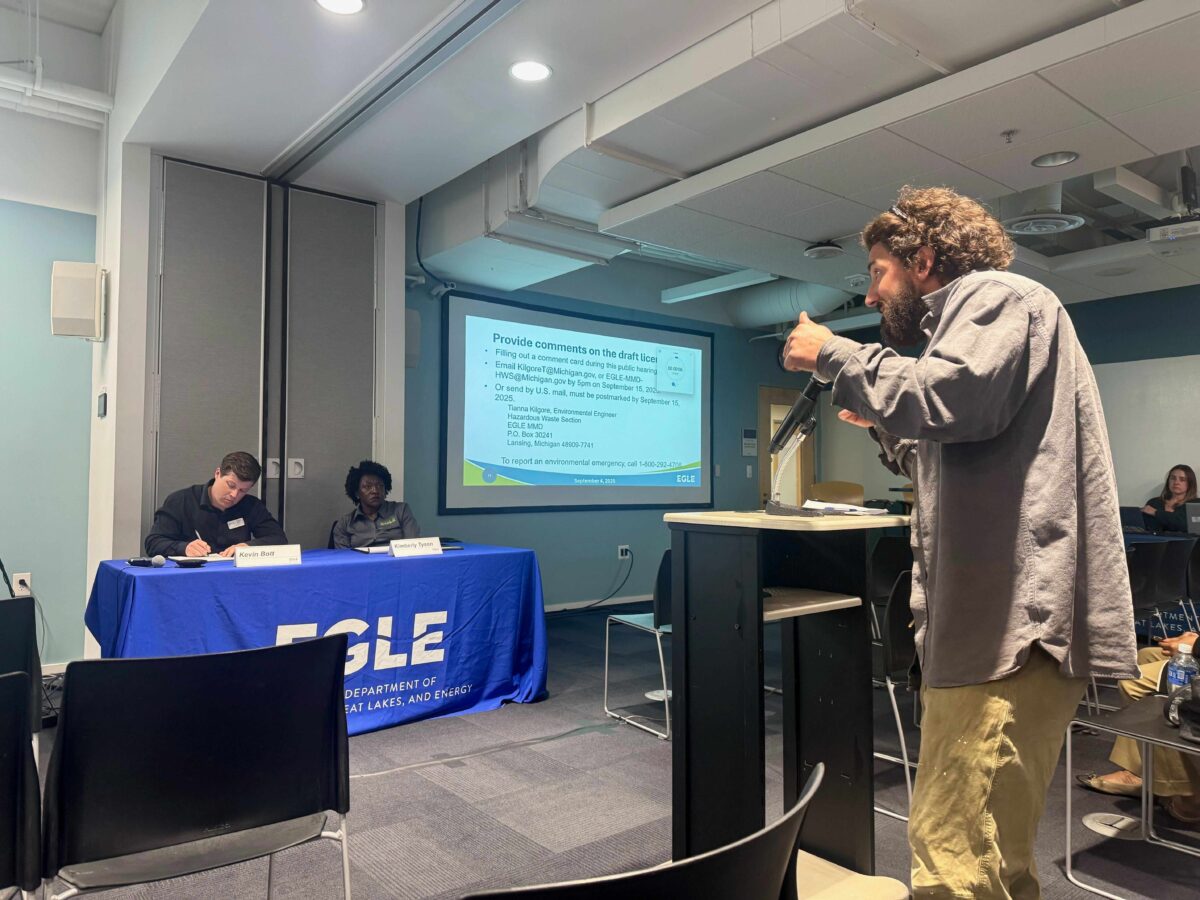Overview:
- A Detroit City Council resolution calls for the city's law and building departments to take enforcement action against Aevitas Specialty Services.
- The oil recycling business on the city's east side has a track record of state environmental violations of air quality and waste regulations.
- Aevitas, which shut down after a June fire, says it plans to redesign and rebuild the facility.
The Detroit City Council is calling for enforcement against an east side oil treatment facility with a decade-long track record of odor complaints that caught fire this year.
Aevitas Specialty Services Corp. shut down after a June 30 fire caused extensive damage to the facility’s treatment machinery.
The council approved a resolution Tuesday introduced by Councilmember Latisha Johnson that outlines pathways for the city to fine or penalize Canadian-owned Aevitas, which recycles and processes used oil and oily wastewater from regional companies.
The resolution passed by council Tuesday urges the city’s law and building departments to pursue enforcement mechanisms against Aevitas.
The city needs to find legal pathways to halt Aevitas’ operations until air quality concerns are addressed, Johnson told Planet Detroit.
“They should find a different location to do the work that they do,” Johnson said ahead of Tuesday’s vote.
“It will continue to permeate the air in that community if they continue to do the same thing.”

The city can seek civil fines and remedies through its property maintenance code, as well as impose penalties on Aevitas if it finds the facility created “an environmental nuisance,” according to a report from the council’s legislative policy division.
The city’s zoning code does not allow for permanent closure of Aevitas, the report said. It provides legal options to suspend any facility from operating if emissions exceed lawful limits, and authorizes the city to withhold or revoke a certificate of occupancy if it does not conform to zoning, potentially delaying Aevitas’ ability to reopen its facility.
‘Small business’ with history of environmental complaints, violations
The facility, located at 663 Lycaste St. near East Jefferson Avenue, is within a mile of residential neighborhoods such as Jefferson Chalmers and the Marina District, as well as other industrial sites such as the Stellantis Detroit Assembly Complex and Clean Earth.
“When you look at its proximity, we should make some efforts to downzone,” Johnson told Planet Detroit.
The state has filed 64 air complaint investigation reports on Aevitas, 17 of which were filed since 2024, according to the city’s report.
Aevitas has received five air quality violations from the state since 2012, four of which were for “persistent objectionable odors” impacting residents who live downwind.
Since 2012, the Michigan Department of Environment, Great Lakes, and Energy’s materials management division has conducted seven inspections at Aevitas, and its records indicate 17 violations, said EGLE spokesperson Josef Greenberg Stephens. The materials management division oversees waste.
Of those 17 violations, 10 were resolved, three of them by formal enforcement, according to EGLE.
“The remaining seven are a result of two inspections conducted in 2025 and are currently open in our database; however, Aevitas has responded adequately and MMD staff will be returning these to compliance,” Greenberg Stephens said.
Aevitas Specialty Services CEO Rob Slater told Planet Detroit the company is a “small business” that “serves an important role in supporting manufacturing in Detroit” by recycling industrial waste oils for the region’s automotive manufacturing industries.
“Oil recycling provides a vitally important environmental service by removing waste oil from landfills and reducing the amount of new crude oil that must be refined,” Slater said in an email.
“Aevitas does not burn waste oil or generate particulate matter.”
The city’s report has “several inaccuracies” related to Aevitas’ number of violations, Slater said, adding that Aevitas addressed three odor violations since November 2022, “with the initial step being ceasing operations until the cause of the odor is determined.”
June fire sparks city scrutiny of Aevitas
The council resolution comes four months after an industrial fire at Aevitas caused “substantial” damage to the facility’s waste treatment operations, according to an EGLE site inspection conducted following the blaze.
The cause of the fire is undetermined. The suspected cause is an electrical event, said Corey McIsaac, spokesperson for the Detroit Fire Department.
A firefighter was injured during the city’s response to the fire, which took about seven hours to bring under control.

As many as six commercial oil storage tanks as well as refined oil, unrefined oil, and waste oil caught fire, McIsaac said. The department’s hazmat team monitored the air, “which came back clear,” and partnered with local companies to clean up oil spills in and around the facility, she said.
Aevitas shut down operations after the fire and said it offloaded its waste treatment and oil recycling services to “an alternative third-party licensed facility in the area.”
Eden Bloom, an east side resident and community organizer, spoke at Tuesday’s council meeting in favor of the resolution. Nearby residents frequently reported diesel and chemical smells, and the complaints “nearly disappeared” after Aevitas ceased operations, Bloom said.
Area odor complaints to EGLE’s Pollution Emergency Alerting System dropped by 90% since the facility closed, according to Bloom’s analysis of complaints to the state through Oct. 15.
Particulate matter levels in the area were moderate for over two-thirds of February and March 2025, according to a city review of JustAir monitoring data within 1 mile of Aevitas. Short- and long-term PM 2.5 exposure is linked to various chronic and acute health problems.
Emissions from the June 30 fire drove local AQI levels above 150 and may constitute a violation of the city’s zoning requirement that facilities comply with state and federal air quality requirements, the city report said.
Aevitas CEO Slater said the city’s air monitoring data is inaccurate given the monitor’s distance from the facility.
“The largest sources of particulate matter are vehicles and industrial-scale combustion equipment, and Aevitas’ waste oil processing does not generate particulate,” he wrote.
Aevitas air quality permit ‘obsolete’: state regulator
While Aevitas is temporarily closed, the company said it plans to redesign and rebuild the facility.
In a July 29 letter to EGLE, Slater told the state regulator the facility would be rebuilt in the same location with updated and indoor processes for treating waste and oil, as well as “new higher efficiency and lower energy-use odor control scrubbers” to “eliminate odor incidents.”
For Aevitas to resume its waste treatment operations, it will need to comply with state regulations.
In an inspection of Aevitas in August, EGLE said “extensive fire damage” to the facility’s equipment made its air quality permit “obsolete.”
“A new air permit will need to be issued before installation or modification of new process and control equipment can commence,” the Aug. 8 inspection report said.
“The facility cannot operate until the damaged process equipment is replaced and a new permit is issued by (EGLE’s air quality division).”
🗳️ Civic next steps: How you can get involved
Why it matters
⚡ East side residents living near industrial sites have complained of nuisance odors for over a decade. The city council’s report on Aevitas illustrates how local officials could hold companies accountable for violating state and federal air quality standards.
Who’s making civic decisions
🏛️ The Michigan Department of Environment, Great Lakes, and Energy regulates industrial sites to ensure they are meeting state air quality and waste treatment standards. The City of Detroit’s Law Department and Buildings, Safety Engineering, and Environmental Department oversee enforcement and legal action over city ordinances and zoning.
How to take civic action now
- 📱 Call EGLE’s Pollution Emergency Alerting System (PEAS) hotline at 800-292-4706 to report any odor complaints, air quality concerns, or potential chemical spills. The number is staffed 24/7. Complaints can lead to on-site investigations of industrial sites. You can also call the City of Detroit’s Environmental Health Complaints number at 313-876-4715.
- 🌱 Follow community organizer Eden Bloom’s educational blog about east side industrial sites or Eastside Community Network’s Eastside Climate Action Coalition to keep up with environmental advocates.
- 📩 Contact District 4 Detroit City Councilmember Latisha Johnson’s office at 313-224-4841 or councilmemberjohnson@detroitmi.gov.
- 📣 Ask your elected officials how they plan to hold industries accountable in instances of environmental violations.
What to watch for next
🗓️ Watch for action from Detroit’s law or building departments regarding Aevitas. The waste treatment facility is in the process of redesigning and rebuilding before it seeks permits from the state to reopen.
⭐ Please let us know what action you took or if you have any additional questions. Please send a quick email to connect@planetdetroit.org.
MORE PLANET DETROIT REPORTING
Jefferson Chalmers looks to seawalls to overcome flood insurance burden
“It’s such a unique neighborhood, and there’s a lot of work that needs to be done to come up with a fix that is equitable,” says Jefferson Chalmers resident Dan Piepszowski.
US Ecology hazardous waste facility’s neighbors urge license rejection: ‘Who wants to live in a place that’s massively polluted?’
Michigan’s environmental regulator issued an air quality violation for a US Ecology hazardous waste facility in Detroit on the same day as a public hearing on its license renewal.
Michigan’s environmental regulator holds east side workshop after civil rights complaint on Stellantis permit
Michigan’s environmental regulator agreed to hold an informational meeting with the community around the Stellantis plant in its informal resolution with the EPA of a civil rights complaint.





